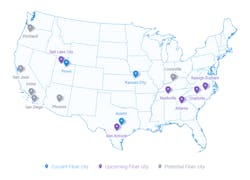Google Fiber says it has added Louisville, KY, and Irvine and San Diego, CA, to the list of cities in which it might offer its gigabit fiber to the home (FTTH) service. The FTTH service provider now has 15 markets on its list of active, in process, and potential markets.
At the moment, the active FTTH service component is easily the smallest component of that list. As the graphic above illustrates, Google Fiber is available only in Austin, TX, Provo, UT, and its original market, the Kansas City, KS and MO area. The company says it has firm plans to expand into six other markets, leaving three other markets besides the newest trio still in the negotiation phase.
Meanwhile, having enjoyed first-mover advantage in Kansas City, the company now appears to be moving more slowly than its supposedly more monolithic competition. AT&T beat Google Fiber to the market with gigabit services in Austin, Nashville, Atlanta, Charlotte, and Raleigh/Durham (see, for example, "AT&T launches GigaPower FTTP in Greensboro, Durham"). Comcast, meanwhile, is marketing its 2-Gbps Gigabit Pro FTTH service in Atlanta and Nashville (see "Comcast markets 2-Gbps Gigabit Pro in seven states").
Undaunted, Google Fiber will repeat the vetting process in the three new communities it has followed in other markets. It will first work with local authorities on a study of conduct a study of such construction factors as local topography, housing density, and the condition of existing infrastructure. Meanwhile, community officials will be required to complete an information checklist. Only after these two steps are completed will Google Fiber make a decision on whether to proceed with fiber-optic network deployment.
For more information on FTTx equipment and suppliers, visit the Lightwave Buyer's Guide.

Stephen Hardy | Editorial Director and Associate Publisher
Stephen Hardy has covered fiber optics for more than 15 years, and communications and technology for more than 30 years. He is responsible for establishing and executing Lightwave's editorial strategy across its digital magazine, website, newsletters, research and other information products. He has won multiple awards for his writing.
Contact Stephen to discuss:
- Contributing editorial material to the Web site or digital magazine
- The direction of a digital magazine issue, staff-written article, or event
- Lightwave editorial attendance at industry events
- Arranging a visit to Lightwave's offices
- Coverage of announcements
- General questions of an editorial nature
